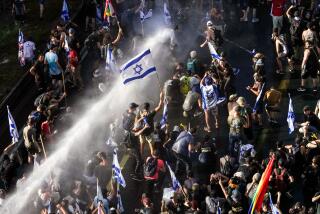Egypt’s new parliament holds inaugural session
Reporting from Cairo — Men in pressed suits and polished shoes, some carrying holy books and sporting beards, rushed past concrete barricades and hurried beneath a silver dome to begin setting laws for a nation that for generations had oppressed and imprisoned many of those now rising to power.
Egypt’s new parliament held its inaugural session Monday, and a sense of wonder was mixed with the gravity of a country still under military rule and beset by economic turmoil. Dominated by the Muslim Brotherhood, once banned from running for office, the chamber echoed with the raucous voices of a burgeoning political era that is replacing the specter of Hosni Mubarak’s corrupt secular government.
“I invite the distinguished assembly to stand and read the fatiha [Muslim prayer] in memory of the martyrs of the Jan. 25 revolution,” said Mahmoud Saqa, 81, of the liberal Wafd Party who, as the oldest member of the chamber, led the opening session. “The blood of the martyrs is what brought this day.”
Parliament’s 498 elected members were individually sworn in, a ceremony that lasted hours, with some lawmakers dozing off and others ad-libbing. A few squabbled, a number read the Koran. One from the ultraconservative Salafist party Al Nour said he would never “contradict sharia,” or Islamic law. A liberal member said, “We will continue the revolution.”
Saad Katatni, secretary-general of the Muslim Brotherhood’s Freedom and Justice Party, was chosen as speaker of the Assembly after a spirited challenge by a former Brotherhood member. Like his fellow legislators, Katatni won his parliamentary seat in Egypt’s freest elections since the 1952 coup that spawned decades of autocratic rule by presidents drawn from military ranks.
That template has certainly changed. So many lawmakers — only five are women — wore beards that Facebook pages joked that the session looked more like a mosque at Friday prayers than a legislature.
“Egyptians can actually feel the fulfillment of a great achievement,” said Farid Ismael, a member of Freedom and Justice. “From the enthusiasm of the MPs that I’ve seen today, I can tell that this parliament will adopt the demands of the revolution and bring the country the development and reform we’ve been dreaming of for decades.”
Riot police stood guard outside as men held flowers, danced and sang folk songs. Flags snapped, banners unfurled. But just beyond the celebration stood blackened buildings burned in a year of rebellion and lines of hundreds of poor men waving slips of paper for free medical care. The contrasts spoke to an Egypt yearning for change but tangled in the troubles of its past.
“I am here today to see the revolution complete,” said Mahmoud Bayoumi Heikal, an ultraconservative Islamist. “It’s like putting the crown on what we did.... Many in the parliament have been in prison. They understand poverty and oppression. Egyptians know our country is at ground zero. It will take time and patience to rebuild.”
Several thousand antigovernment protesters arrived hours later, thronging the battered streets and condemning the ruling Supreme Council of the Armed Forces, or SCAF. Many Egyptians fear the army will keep parliament subservient and influence its decisions, especially the drafting of a constitution and the question of whether generals should be held accountable in the deaths of protesters.
“We are here today to stress the demands of the continuing revolution and to confirm that electing a parliament was just a beginning and that SCAF needs to cede power as soon as possible,” said Ahmed Raslan.
The once-outlawed Muslim Brotherhood, a font of militant Islam decades ago, controls 47% of the seats in parliament and the more conservative Salafis nearly 25%. Their ascent is a vivid marker of an emerging political Islam that is replacing despots swept away by uprisings across the region. Secularists worry that sharia may supplant civil liberties even as the military presses the Islamists to protect human rights and religious freedoms.
Parliament’s most crucial task will be electing a 100-member panel to write the constitution. The Muslim Brotherhood has stressed that Egypt’s economic troubles — joblessness, dwindling foreign investment and shrinking tourism — will consume much of its agenda.
“This is one of the greatest days in the history of modern Egypt,” said Abdul Hamid Mohamed, a Muslim Brotherhood supporter from the Nile Delta. “But we need security. We need to end poverty and fix our financial problems. We voted for this parliament, and now we must live with that choice.”
A new government will not be completely in control until after a president is elected in June. The military has vowed to then step aside. Many wonder whether the army will keep that promise, but throughout much of the day Monday there was a distinct sentiment that the vestiges of the Mubarak days were being replaced.
“God never accepts injustice,” said Magdi Hassan, a political prisoner under Mubarak for nearly a decade until he was freed after the revolution. “One day the unjust are on the top but the next day they are on the ground and behind bars, and those they oppressed are on top. This is what’s happening now.”
Stepping out of parliament after his first day as a legislator, Sherif Taha, a member of Al Nour, said: “I shed tears for the first time in many years.... No one can ever deny that if it weren’t for the revolution, we wouldn’t be here today.”
Hassan is a news assistant in The Times’ Cairo bureau.
More to Read
Sign up for Essential California
The most important California stories and recommendations in your inbox every morning.
You may occasionally receive promotional content from the Los Angeles Times.











